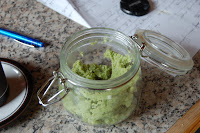

I made a Roman feast! I did! Honest! And some of it counted as allotment food!
About a month ago we were in Bath and my souvenir of our visit to the baths was a selection of books with historical recipes in them. One was "A Classical Cookbook" by Andrew Dalby and Sally Grainger. Ok so I have revealed my sources!
On Saturday I decided we were going to have a feastus romanus to celebrate my newus jobus. Again more later when all signed, sealed and delivered. In the mean time I am allowing myself a brief period of rejoicing which meant a roman dinner on Saturday. I have long been interested in food history, anorak that I am, and so was hugely excited. We recently watched a BBC programme where they had two presenters who had to eat Roman food but they gave them the really rubbish things to eat because obviously if they gave them the good stuff there would have been no drama!
I should explain that we had our meal in true Roman style lounging on the sofas and eating off the coffee table!
First up, although not allotment-based, was Conditum Paradoxum which sounds like a medicine. It is to be seriously recommended! SERIOUSLY! It is a spiced wine.
Romans traditionally served a honeyed wine called "Mulsum" as an aperitif but this one is a step up from that (oooooh get us! ) and includes white wine, honey, black pepper, bay leaf, saffron and a date. It was great - a bit like mulled wine only better.
First course various fruits including our own figs. I got the same type of fig as we have from a certain well-known supermarket and really there was no comparison. you can see the difference in colour etc from the picture.
I also made a dish called "Moretum" or garlic cheese with garlic from the allotment and it was really not for the faint hearted! In fact I shall put a warning on it:
DO NOT MAKE THIS DISH IF YOU DO NOT LOVE GARLIC. DO NOT PLAN TO KISS ANYONE WITHIN 24 HOURS OF EATING IT!
The original source, according to Sally, was from a book called "Cato's Farm". He was an early Roman soldier and politician who apparently expelled people from the Senate for lacking in morality. All he would have had to do was breathe on them after he had eaten his moretum. That would expel anybody.
He was obviously a very busy man because he also wrote a farming handbook for people who were looking to invest in a farm which really covered all aspects of it and included advice on how to make it profitable and how to store and cook the produce - a bit like an early Roman River Cottage. Apart from the slaves. So anyway this is his recipe for moretum which is a bit like humus in texture and apparently is best eaten spread thinly on crusty bread.
MORETUM
Ingredients
2 heads (20 - 25 cloves) garlic - honestly I did warn you - peeled
225 g pecorino romano, parmesan or similar hard Italian cheese
1 large handful of coriander leaves
2 heaped teaspoonfuls chopped fresh celery leaf
1 teasp salt
1 tblspn white wine vinegar
1 tblspn olive oil.
It also calls for 2 teaspoons of rue which I didn't use partly because I couldn't get it and partly because it is, as they say, boggin. It was herb used in Roman cooking for some inexplicable reason. Apparently it smells foul and tastes even fouler and could possibly be poisonous. Heidi the Herbalist in Holywood said she had never been asked for it as a cooking herb before - only as a treatment for rheumatism. But she said she would get me a plant. I just want to see how foul it is myself.
METHOD
Get your slave to grate the cheese and then pound all the other solid ingredients together in a pestle and mortar to form a smooth paste. If you don't have a slave or a pestle and mortar, do it in the food processor.
Stir in the vinegar and olive oil.
We loved it but it is VERY strong.
For the main course we had roast shoulder of pork but I can't really justify putting the recipe here since it had no significant allotment ingredients. But I had never tasted anything quite like it!
Have to go to bed now.
No comments:
Post a Comment